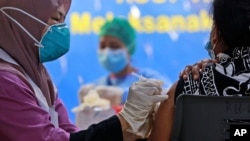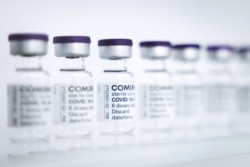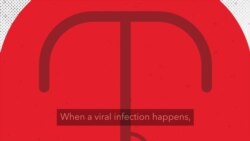"Better than nothing."
That's one infectious disease expert's assessment of Sinovac Biotech's COVID-19 vaccine, following reports that hundreds of Indonesian health care workers who had received the vaccine caught the disease anyway.
At least 10 doctors have died despite having been fully vaccinated with two doses of Sinovac's CoronaVac vaccine, according to the Indonesian Medical Association.
It's unclear how widespread these "breakthrough" infections are. It's also not clear how severe most of the infections are. Little peer-reviewed data on the vaccine are available.
What information is available suggests that the vaccine is less potent than others, especially against the highly contagious delta variant that was first detected in India.
However, access to more effective vaccines is limited in much of the world, experts note. Indonesia is one of dozens of countries where the Chinese company's vaccine makes up a substantial part of the available doses.
While the shortage of published peer-reviewed data makes it hard to evaluate the vaccine, a few available studies provide a glimpse.
The government of Uruguay released data earlier this month showing CoronaVac reduced COVID-19 infections by 61%, hospitalizations by 92% and deaths by 95%.
Although not peer-reviewed, the study is one of a few that compare CoronaVac with another vaccine.
Pfizer-BioNTech
The Pfizer-BioNTech shot performed better against infections in general in the study, lowering rates by 78%. But hospitalizations and deaths were about the same.
It's not clear what the dominant variant was during the study, however.
A key measure of vaccine potency is the level of neutralizing antibodies — the proteins the immune system produces that prevent the virus from infecting cells.
The Pfizer and Moderna vaccines produce very high levels of these antibodies, which help maintain protection against variants, said Peter Hotez, dean of the National School of Tropical Medicine and a professor at the Baylor College of Medicine.
"Yes, you're getting some breakthrough infections with the delta variant, but they tend not to be serious infections," he said. "People aren't being hospitalized or losing their lives because of COVID-19."
"When you look at some of the data on the Sinovac vaccine," he added, "the levels of virus-neutralizing antibody, even after two doses, can still be quite low."
The Sinovac vaccine produced lower levels of these antibodies than seven other vaccines, including those from Pfizer, Moderna, University of Oxford-AstraZeneca and Johnson & Johnson, according to a study in the journal Nature Medicine.
The antibody response is even less effective against the delta variant, which has exploded in Indonesia and many parts of the world.
It's not clear, however, exactly what that decline means for patients. The vaccine still offers protection against the most serious forms of the disease, a Chinese official told state media.
In China's first delta outbreak, in Guangdong province earlier this month, "none of those vaccinated infections became severe cases, and none of the severe cases were vaccinated," said Feng Zijian, former deputy director at the Chinese Center for Disease Control and Prevention.
Meanwhile, supplies of other vaccines are arriving slowly in much of the world.
"Sometimes, that's all people have access to," Hotez said. "It's better than nothing."







